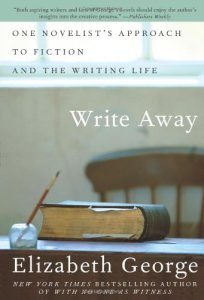I’m in California now, in the basement apartment of my father’s house. Tomorrow is my sister’s wedding: the Big Day. Yesterday I got my toes and nails done, and took Dad to a barber to get trimmed up. Today I’ll find a card, which as any woman knows is a time-consuming task, necessitating reading every card on the rack. The card store I have in mind is close to two of my favorite clothing-shopping stores, so will I be able to resist? (Doubtful.) A very good bookstore used to be in this block too, but the last time I was here, it seemed on last legs. If it’s still there, I’ll browse there, too.
I’ve been reading Elizabeth George‘s Write Away, and I like it. I love the quotes from her journals, her fears and struggles. She has a very matter-of-fact way of putting things. I’m almost finished with it, in part because I don’t read the excerpted examples included (never have, never will).
Here are some quotes.
“…your setting should be a place that you want to know about, a place you are interesting in exploring, a place you want to describe, a place that resonates with you … ” [24]
“What you should keep in mind is that anything in a character’s environment can serve as an indicator of his internal landscape if you use it wisely.” [38]
She makes it clear that you need conflict to have a story, and that events must occur as the conflict unfolds, and that these events “must be organized with an emphasis on causality.” (Like dominoes.)
Which made me ask: what is the central conflict in my story?
I like this especially:
“Skilled writers know that what you’re supposed to do is continually open up your story. You do this by creating scenes in which you lay down—but do not answer—dramatic questions. You do this by making sure that if you do answer a dramatic question in a scene as the novel progresses, you’ve already laid down another. You do this by making partial disclosures instead of giving out all the information you possess.” [43]
In other words, the writer is a tease.
On character (which is where she begins):
“I believe it’s critical to know the basic need each character has in his life because the denial of that need leads directly to the second area that I consider crucial in developing a character. This is his pathological maneuver. Better said, it’s what the character does when he’s under stress. The supreme stress he’s ever under, by the way, is having his efforts to meets his core need thwarted.” [50]
“The final important area that I include in my analysis is to decide what the character wants in the novel. (I make this decision about each scene as well, giving an agenda to each character in a scene.) [52]
More on voice and plot to come …
And no, I haven’t been getting to my scenes. Thinking of them, but coming up short.
(Having written that, I wrote the five.)


